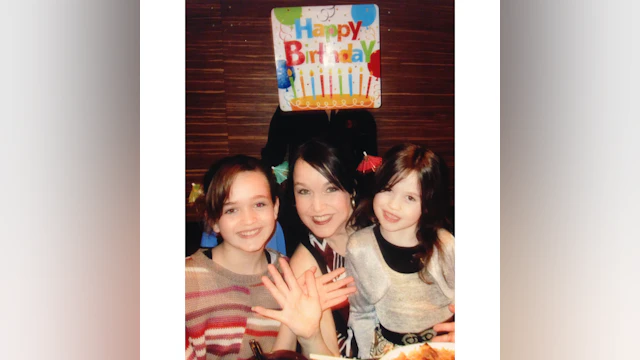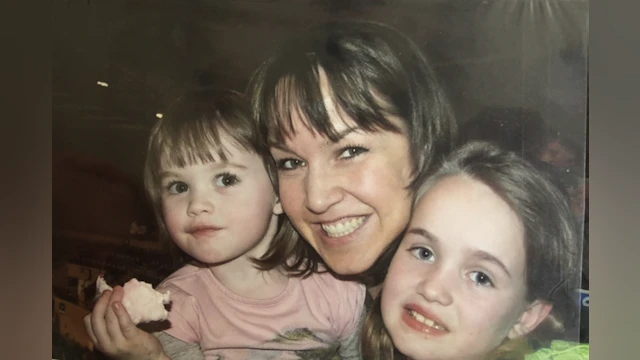When I was 14 years old, I lost my mother, Sabrina Jones, to suicide. Up until my mom's death, I did not understand to what extent mental health could affect your everyday life, including my own. My mom was successful, motivated and kind, but struggled with many mental health issues. I was lost as to why she was so sad when it seemed to me there were so many things going well for her. I couldn't understand how she was feeling – but I did know that sometimes I, too, felt hopeless, even before her passing.
For as long as I can remember, I had always been really hard on myself, blaming myself for family situations that were out of my control: divorce, financial issues, parental substance misuse, etc. By the age of 10 or so, I began to dislike myself for being unable to fix everyone's problems. As a result, I bottled up my feelings, instead of talking to my family about these issues. I had also been overly anxious for as long as I could remember. All of this took a toll on my mental health, and I started going to therapy. I couldn’t help but wonder: “What was so wrong with me that I was in therapy as a 12-year-old?”
I was so scared to tell anyone where I spent my Saturday mornings: why I had to leave sleepovers to go to therapy, or why I couldn't control my emotions some days. Unfortunately, since therapy and mental health felt so stigmatized, I never talked to anyone about why I went to therapy… just as my mom bottled up her feelings rather than seeing a therapist.
My first therapist wasn’t the perfect fit for me, but I continued to see them because I hoped that over time, I would start to feel better. We spent sessions talking about coping strategies for when I got sad, anxious, and overwhelmed. Therapy, for me, was about working towards handling my emotions because I was too young to understand them. Up until my mom’s passing, I spent most of the sessions trying to focus on what I could control, like my thoughts.
Still unsure how to cope with the difficult feelings I was experiencing in general, I was in peril for many months after my mother’s passing. It was the hardest period of my life: trying to understand why she had felt so hopeless. After her death, I took a break from therapy for a few months, since I couldn’t bear to say my mom’s name without bursting into tears. I talked to my family a lot during this time. Being surrounded by people who knew and loved my mom felt good enough for the time being. When I went back to therapy, I started to come to terms with my anxiety and the PTSD I had developed since my mom’s death.
Talking about my mom was difficult. I often strayed away from discussing my happy memories of her, and began questioning why she felt so sad and helpless. Therapy helped me reframe my memories of her to focus on the happy moments, rather than what happened before she died.
Guilt was a common feeling for me both before and after my mom was gone, and it activated a lot of insecurities and mental health issues for me. I was anxious, depressed, and felt guilty about my mom’s death. Was there more I could have done? There were so many questions in my mind about how I could've prevented my mom’s suicide. After a few years of therapy, I began to realize that her death wasn’t something I could control. I was able to understand that there are many aspects that overlap with an individual’s mental health that can lead to suicide.
People tried to protect me from talking about suicide and mental health, but that only complicated my understanding of my mom's death. All I wanted to do was talk about my mom without having the cause of her death affect the way people remembered her or how they looked at me. I wanted to scream her name and bring her back. All I needed was to remember my mother for who she truly was, rather than what she went through.
Finding ways to memorialize my mom through days like her birthday and Mother’s Day made a big difference for me and my family. Simple acts like wearing purple (her favorite color), and speaking French (as my mom did) are just a few things we now do to remember her. I also participated in my first AFSP Out of the Darkness Walk in Omaha, Nebraska, in memory of my mom – and realized I wasn’t the only one affected by mental health and suicide. Finding that community of people, all walking together, encouraged me not to keep my feelings to myself, and let me know this is something we can talk about openly.
Based on that experience, I started speaking up and sharing my story because I wasn’t going to let my past determine my future. I lost my mom, but I was going to do everything in my power to share her memory and positivity with the rest of the world. I now spend every May 30th, the anniversary of my mom’s passing, remembering the beautiful bright light she was, and spreading awareness about suicide prevention. I can’t bring her back, but I can help other families from experiencing the same pain.
We must speak up about those lost to suicide to bring hope to fellow suicide loss survivors.
It is okay to discuss these topics with kids before they lose someone to suicide or they, too, are thinking about suicide. Although my mom and I were struggling at the same time, we both felt too ashamed to open up, because everyone perceived us so differently than how we felt on the inside. The worst part is, we didn't even talk to each other about our feelings.
It wasn't until I truly understood what mental health was that I realized my mom couldn't control her sadness and needed to reach out for help. Mental health isn't as scary as people make it out to be. The more I realized this, the easier it was to cope with my own emotions. I was a child experiencing mental health symptoms, but had no clue until I was forced to reevaluate my understanding, after my mom's death.
I believe the healing process is an ongoing process. Some days will be harder than others, but all we can do is remember there are better days to come and that, together, we can help to prevent suicide. Never forget you are not alone in your struggle, and that help can be found closer than you may think.

